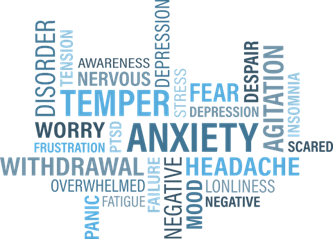Let Us Know, So We Can Help
April 29, 2023
 May is National Mental Health Awareness Month when Trinity Health reminds patients that behavioral health — also known as mental health — is a vital part of overall wellness.
May is National Mental Health Awareness Month when Trinity Health reminds patients that behavioral health — also known as mental health — is a vital part of overall wellness.
Margaret Szarowicz, LMSW, is a clinical social worker who has worked for 10 years at Trinity Health Grand Rapids Hauenstein Neuroscience Center. With her vast experience, we asked her to share her answers to commonly asked questions about behavioral health and a serious medical diagnosis.
Q: Is it “normal” for a patient or caregiver to become depressed or anxious when receiving a serious medical diagnosis?
Szarowicz: Absolutely. It is very common for this to occur. It is normal for a patient (or caregiver) diagnosed with a chronic or serious medical condition (e.g., cancers, renal disease, infectious diseases, neurological diseases) to react by experiencing depression, anxiety or an adjustment disorder. If this doesn’t happen immediately, it could develop as the disease progresses.
Unfortunately, there is still a stigma attached to a diagnosis of mental illness or behavioral disorders. When the patient or caregiver is diagnosed with a behavioral health issue, health care providers will do all they can to normalize this for them.
Q: What are the differences between depression, anxiety, and adjustment disorders?
Szarowicz: Let’s take them one at a time.
Depression most commonly manifests in feelings of hopelessness and helplessness, loss of interest in activities, changes in sleep and eating habits, crying, difficulty concentrating, or feeling overwhelmingly sad or irritable.
Common symptoms of anxiety include nervousness, restlessness, increased sweating, rapid heart rate, rapid breathing, shaking, and difficulty concentrating.
Adjustment disorders present in ways that are similar to depression and anxiety, but they are in response to a specific life event. The patient has difficulty appropriately adjusting to the change in a certain time frame (usually 3-6 months). It is common for patients to show symptoms of an adjustment disorder when receiving the diagnosis of a chronic condition because they are not able to “adjust and move on” because their current coping skills are not effective.
 Q: What treatments are commonly used for depression, anxiety, or adjustment disorders?
Q: What treatments are commonly used for depression, anxiety, or adjustment disorders?
Szarowicz: Medications, counseling (aka psychotherapy or talk therapy), and support groups are most often used for depression, anxiety, and adjustment disorders. Depending on the individual, one or more of these treatments could be prescribed.
Frontline medications that many people have heard of are Zoloft and Lexapro. Primary Care providers as well as specialists can prescribe these medications. If frontline medications do not take care of the symptoms or if over time, they become less effective, the patient could receive a referral to a psychiatrist, who can evaluate the situation and prescribe appropriate medications.
There are nonpharmacological options too. The patient could receive a referral for counseling. Major life stressors, such as having a serious medical condition, can lead to relationship changes. For example, your husband may have received a chronic disease diagnosis. If he used to pay bills, mow the lawn, and take care of car maintenance — and now after 30 years of marriage you need to take care of those things — that is a huge change for the caregiver. Medication may not be the best treatment. Talk therapy may be more effective.
Support groups can benefit patients and caregivers too. Our hospital has support groups for specific diseases, but there are often support groups offered through local organizations that partner with hospitals. Talking to other people who are on the same journey can be helpful.
Q: Do you screen patients for behavioral disorders?
Szarowicz: We try to screen for it during appointments. However, physical symptoms tend to take priority during office visits. But when possible, we try to ask about mood. If a caregiver is at the appointment, we ask the caregiver about the patient’s mood. We try to bring this up in each visit, but there isn’t always time.
Between visits, we invite patients to reach out to their care team via MyChart and send a message about a concern. It isn’t always necessary to see a patient in person to prescribe a medication.
There is a PHQ-9 (Patient Health Questionnaire – 9) depression screening tool. Most primary care offices are required to screen patients using this tool.
Q: What is the difference between a psychiatrist, a psychologist, a social worker and a licensed professional counselor (LPC)?
Szarowicz: Let’s take these individually.
Psychiatrist: A medical provider (MD or DO) who can prescribe medication. Physician assistants and nurse practitioners working under a psychiatrist can also prescribe medication.
Psychologist: A medical provider with a doctorate degree (PhD) or master’s degree in psychology. A general psychologist does group and individual counseling (aka psychotherapy and talk therapy) and is trained in a particular form of therapy.
Social Worker: A master’s level behavioral health provider who does counseling. In-patient social work consists of managing medical cases, navigating community resources for the patient, and helping with psychosocial health care issues, such as stress, hostility, depression, hopelessness.
Licensed Professional Counselor: A master’s level behavioral health provider who does counseling.
An Invitation to You
Please don’t let the stigma of behavioral health symptoms stop you from sharing your situation with your provider. A behavioral health diagnosis is not a weakness.
At the first sign, take action. Don’t let depression or anxiety impact your day-to-day life. Health care providers are here to help you, but first, you need to let us know.
Learn more about Trinity Health’s Mental and Behavioral Health Services.



